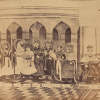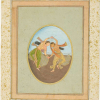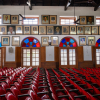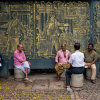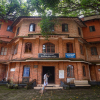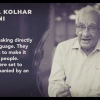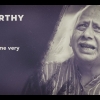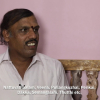He is also a filmmaker and an activist and has won several prestigious awards for his artistic and social enterprises.
Budhan Theatre was founded by Dr Ganesh Devy, a scholar and literary critic, in 1998, and since its inception, it is known for anti-establishment plays in alternative spaces. Here, we talk about the history of DNT, the journey of Budhan Theatre, the censorship issues it has faced, the connection between thieving and theatre, and the active effect such alternative theatre spaces can have on society.
Following is the edited transcript of the interview conducted by Abhimanyu Acharya over the phone on April 25, 2020.
Abhimanyu Acharya (AA): Can you tell us about the history of the Chhara community and its current status in India?
Dakxin Bajrange Chhara (DBC): To understand the history of Chharanagar, one needs to understand the history of nomadic and denotified tribes. For that, one must go to the nineteenth century. In 1831, the queen of England sent an officer named Sleeman to India. It was because there used to be a man called Umaji Nayak, who is considered a hero amongst the tribal communities. He used to live in the forests of Pune and was clever to never let any British person enter the forest. Sleeman roamed around in India and saw that there were so many nomadic tribes in India who were not part of the ‘tax net’ of the British and were not paying any taxes to the British. For British society, which was and still is primarily a sedentary society, it was a puzzle. They did not understand why a certain section of any society would keep travelling and moving places. All these nomadic communities were considered suspicious, and on Sleeman’s recommendation, the East India Company formed a special department called ‘Thuggi and Dacoity department’. The department worked to catch several people from these nomadic communities; those people were later killed because they were considered dacoits. Some 2000 people were killed in that manner.
The revolution of 1857 was also an important incident that one needs to understand. Indians were not as advanced in terms of transportation, communication as well as arms and ammunition as the British. How, then, was the 1857 revolution so organised? A major reason was these nomadic communities who not only acted as messengers between different parts of the country but also supplied and transported arms. These communities included Nat, Bajaniya, Miyana, Koli, Chharas, Bhamtas, Vadars, etc. There are not many studies about the contribution of the nomadic communities, but I think a few people have written on it. Following the revolution of 1857, these communities came under the radar of the British. Around 1866, a new theory was formed in Europe. If I remember correctly, it was called ‘Eugenic theory’ [‘born criminal’ theory], and its founding father was the Italian criminologist Cesare Lombroso. According to him, criminality can be passed on in heredity, biologically. If the father is a criminal, then the child is automatically a criminal. That’s what he somehow proved. The British elite like Churchill and others used to believe in this theory, and to control the nomadic communities and to ‘rehabilitate’ them, a new law was passed in 1871 called the Criminal Tribes Act 1871 under which around 200 communities were listed as born criminals and they were forced to stay in the settlements. The larger aim was, of course, to bring them under the tax net. There were some 52 settlements, and in 1931, one was set up in Ahmedabad too. The most disturbing and dangerous aspect of the criminal tribes act was that if someone from one of these nomadic tribes was caught thieving or doing something illegal, the British had the power to get a hold of his entire family and his entire community and force them into settlements. Another aspect of this was the exploitation that these communities faced at the hands of local zamindars and heads of small villages. They used to blackmail these communities and also sexually exploit the women by saying that they would call the police. Dr. Meena Radhakrishnan has written about this in her book Dishonoured by History. Finally, in 1931, the Chhara people of Ahmedabad were declared as criminal tribes following the setting up of the settlement. This law went on till 1952, and finally, in August 1952, this act was repealed by the newly independent government and all notified communities were denotified tribes. It was also recommended to replace this act by another one called Habitual Offender Act. This act is a state act and is present in every state of the country right now. Under this act, if any person is found doing something illegal thrice, he or she is considered a habitual offender. The nomadic and denotified tribes became the biggest scapegoats of this act. To summarise, the Criminal Tribes Act was not repealed but only replaced. People are still stigmatised and oppressed under this act. Chhara people were let go, and they made their homes right opposite the settlement. Since then, Chharas are not seen as humans. We are still only seen as criminals.
AA: How was Budhan Theatre set up? What is the story of its foundation?
DBC: In 1998, Dr. Ganesh Devy, a professor of English and Padmasree recipient, and noted Bengali writer Mahasweta Devi came to Chharanagar to work for the denotified and nomadic tribes. They decided to meet the DNT communities who had received education. In 1998, they came to Chharanagar and met us. That was the first time in the history of Chharanagar that people from the mainstream society had come with some good intentions there. We had a meeting with them in which they made us aware of our history, the one that our forefathers had not shared with us. We understood why the police were so brutal and oppressive. They said that they wanted to help us in some way. We told them that if they wanted to help, they can lend us some books. Since the public libraries are far away from Chharanagar, we wanted a small library in Chharanagar itself. They immediately complied, and Mahashweta Devi, from her provident fund, took out money to help us set up a library in Chharanagar. In the same library, a book named Budhan was transported from Baroda. This was around July 1998. In the book, there was an entire detailed description of police brutality towards Budhan Sabar [a man from the Kheria-Sabar community of Bengal] which led to his death. Ganesh Devy asked me to read that chapter and asked me if we can make a play out of this incident of Budhan Sabar’s custodial death. While Budhan Sabar’s death happened in Bengal, we were on the opposite end, in Gujarat. Upon reading the text, however, I realised that our situations were similar. What happened with Budhan Sabar happened with us on a day-to-day basis. I told Ganesh Devy that I would try creating a play based on the incident. We created a play about how Budhan Sabar died a custodial death, how Mahashweta Devi fights for him, and how for the first time, a person belonging to the DNT community starts getting justice from the judiciary of India. We performed the play on August 31, 1998, during the first-ever conference about the nomadic and denotified tribes. The play was well appreciated by everyone, including the dignitaries like Mahashweta Devi, Gayatri Chakravorty Spivak, advocate Pradip Roy, and historian RomilaThapar. For the first time, such great people had landed on the grounds of Chharangara. The news about the play went viral and since then, we have been receiving invitations for performing this play, Budhan, from different organisations. We used to go wherever we were invited. And for the first time, in the history of Ahmedabad, an attempt to form a bridge and create a dialogue between us and the government, as well the society was registered.
AA: What are the goals of Budhan Theatre, and how do you strive to achieve them?
DBC: I think the goals of Budhan Theatre are very simple. Through theatre, we strive to reach the country and the world. We not only wish to provide entertainment but also wish to do plays that unsettle people’s hearts and minds. The aim is to also form an emotional bridge between the DNT communities and the mainstream society, simply so that the mainstream society realises that it is complicit with the government in maintaining and perpetuating the oppression and discrimination against us. We want to reach out to people and the government, to make them realise that since the past 70 years or so, the communities that they have considered to be‘thieves’ and therefore, have oppressed, they are humans too. They have dreams, aspirations and they too wish to live their life with dignity. We want to communicate to the government that around 10 crore people that belong to the DNT communities believe that the independence that India got before 70 years has still not reached them. Through theatre, we wish to achieve that independence. There should be policymaking for the development of the DNT communities, mainstream society should accept us, we get good jobs, good healthcare, and a good lifestyle, dignity—these are some of the goals. And to achieve them, I think, organisations like Budhan Theatre should be set up all over the country so that through creative expression, we can raise our voice and demand our constitutional rights as citizens of this country.
AA: Please tell us about some of your notable plays. What were they about, what were the forms and the spaces in which they were performed?
DBC: So far, we have made around 50 plays and have performed some 1,800 times. We usually perform in the format of street plays, but we have also done some semi-proscenium plays. Amongst the plays we have performed, Budhan, Bhookh, Encounter, Choli Ke Piche Kya Hai, and The Balcony are notable. We recently did Paata in Gujarati and adapted [Italian playwright] Dario Fo’s The Accidental Death of an Anarchist in the context of Gujarat. We mostly perform plays in experimental spaces. You give us any corner, and we will perform there. We have never depended on ‘stage’ for our performances. Bus, truck, train, railway station, small huts, we have performed in all these spaces. We experiment a lot with our plays, and we do different types of plays. For instance, our play The Balcony was an adaptation of Jean Genet’s French play of the same name. Choli Ke Piche Kya Hai is a theatrical adaptation of a short story by Mahashweta Devi called Breast Giver. In a nutshell, all I could say is that we have performed many different kinds of plays without depending on the proscenium stage. Peter Brook has written a book called The Empty Space. We follow that. Any empty space is a stage for us.
AA: In your paper ‘Street Theatre as Democratic Politics in Ahmedabad’ co-authored with Caleb Johnston, you have mentioned that traditionally, Chhara community members were thieves and you have described thieving as an art. It is a very interesting phenomenon where a previously criminalised community is now using art, specifically, performance as a tool of resistance. Do you see your practice of theatre as a natural extension of your art of thieving? Do you see any connection between these two arts at all?
DBC: I strongly feel that the art of thieving, which my community has mastered for generations, is not a crime. I can’t see it as a crime. It is the livelihood of my community. My community has always been under the radar of the government, and socially we are discriminated against and oppressed. In such a situation, having a dignified job is not possible. Moreover, police started levying charges against Nats and Bahurupis who used to earn their livelihood through performance, and snake charmers and rope walkers, and started putting them in jail. The reason was that these communities did not have a fixed home or an address. And a person without an address is always suspicious. This is what all the legal systems in the world believe, including India’s. So, I believe that that’s why my community must have started thieving. The reason I consider it art is that first of all, not everyone can steal; secondly, the way our community goes around stealing, it is completely harmless. We never touch anyone. The thieving is more like a magic trick, a deception strategy. For example, a common thieving trick my community uses is one person distracts the target person into talking, while the other person of our community lifts his bag or suitcase or stuff with valuables. This requires excellent performance, and fumbling is not allowed. And just like theatre, the entire thing is planned and rehearsed. That’s why I believe that the way of thieving that my community follows is nothing less than a performance. It is an art. My forefathers might have used this art for whatever purpose, but people from my generation and I thought of using it to raise our voices. Our community is essentially a community of artists—we have very good actors, singers, and dancers amongst us. Why not use our art for reaching out to the government and the people, and for protest? That’s why I chose theatre. So, for the past 20 years, the art that was considered a crime has now extended in theatre and has helped us in reaching out to the country and the world.
AA: Have you dealt with government censorship for your plays? Which play was it, how did the government react and what was your response to that?
DBC: In Gujarat, if one wants to perform in an auditorium, one needs to submit the script for approval to the state government. The censored script is supposed to be submitted to the police commissioner, and we are supposed to let him know when, where, and how often we are going to perform the play. So, there are a lot of restrictions. And I don’t understand this censorship on art despite having the freedom of expression. I had submitted the script of The Accidental Death of an Anarchist for censorship to the government because I wanted to perform that in an auditorium. Amitabh Srivastava had translated it into Hindi. There was one particular dialogue in the play, spoken by the anti-hero of the play, the famous mad man of Dario Fo. He says ‘if one wants to bring social change, it cannot happen through peaceful means. To believe so is foolishness.’ We were asked to remove this dialogue because it talks of violence. Apart from this, there were also some profane words. I am against censorship because constitutionally, we are entitled to the right to freedom of expression. I believe that that right should be given to us in its entirety and not conditionally. Since we did not get the permission for an auditorium show, we performed it in experimental spaces, and so far, I think we must have performed 40to 50shows of that play. Recently, we performed it at the Serendipity Arts Festival because this time the theme of the festival was the plays that had faced censorship.
AA: The Criminal Tribes Act was repealed immediately after Independence in 1949. Do you really think you are decriminalised?
DBC: I don’t believe that we are completely decriminalised. And this is not just about the Chhara community, but around two hundred DNT communities around India constituting some 10-crore people, either still roaming around or living in slums or near railway stations or sewages—these people are looked upon as thieves even today by the government as well as the people. I don’t think the colonial stigma has completely gone away from these communities. It is still there, lurking.
What the British did was to make these communities ‘notified’, but the task of criminalising them was the making of independent India. The elite leaders of the newly independent India did not pay much heed to these communities and considered them criminals. The impact of such an attitude is such that, even today, there is no policy at either state of central level for the welfare of Denotified and Nomadic Tribes. Certain things were shaken up, thanks to the efforts of the community in protesting, making theatre, and raising their voice. But still, no single policy is in place for the welfare of DNT communities. Even today, political parties point us towards the moon and tell us, ‘That is your roti. We shall give it to you someday.’ The person belonging to the DNT community looks at the roti, but he has never tasted it. He salivates looking at the roti. And that saliva has only benefitted the political parties in the form of votes. And this is a brutal reality. I have been involved in political activism for 20 years, and I see that all the governments take so much time in solving this issue. Another reason for our oppression is that the government put us into the OBC category while we should have been put into the SC or ST category. OBC category has a lot of middle-class people, and some of them are very powerful. That’s why we have never been able to compete with them. That’s why we never get jobs and other benefits from the government. I believe that this was a criminal act, of including DNT communities into OBC rather than the SC or ST categories. That’s what we have been fighting for lately. We believe we will be truly independent when we get a constitutional guarantee from the government. And this guarantee can be achieved by including us into SC or ST categories, or having a different schedule altogether with a specified budget and welfare schemes. Until this happens, I don’t believe that India’s DNT communities, including the Chhara community, will be truly decriminalised. It is resoundingly clear from the atrocities we face that the stigma surrounding the DNT communities is far from gone.
AA: Apart from theatre, what are some of the other arts that the Chhara community is involved with?
DBC: As I mentioned, members of the Chhara community are very well versed in many other art forms, most notable amongst them is music. If you come to Chharanagar and ask any kid to sing a song, you will feel that the kid is either trained or takes classes from somewhere to learn music. But nobody is trained in Chharanagar. I believe that it is our genes. Some of them are very good dancers and actors. Slowly, filmmakers are evolving from the Chhara community. There are so many lawyers, some do petty business. A large part of the community brews illicit liquor and sells it, which is a crime because Gujarat is a dry state, and brewing and selling liquor is banned here. I think this kind of sustainable experiment of changing the face of the community through art I have only seen it in Budhan Theatre.
AA: Since the inception of Budhan Theatre, have you noticed any significant change in the way people look at the Chhara community? To what extent do you think the community has succeeded in achieving its goals?
DBC: In 2010, Ganesh Devy had visited Chharanagar. He told us that while talking to the then prime minister Manmohan Singh, he mentioned Budhan Theatre. The prime minister immediately said that he had heard about it. Budhan Theatre, a group performing plays in the slimy, damp and dark streets of Chharanagar had reached the prime minister through media and other means, what could be a bigger change than this? He even said that he would provide a commission, first of its kind, to study the problems of the DNT community. In 2016, the Renke commission was set up. After three years of research, the commission submitted a document to the government of India about the problems that the DNT communities face. Budhan Theatre’s cultural movement also played a significant part in the making of this report. As far as Ahmedabad is concerned, the elite and intellectual class has started recognising the issues we face and lent a helping hand. So far, we haven’t been successful in changing the perception of the police. We haven’t been successful in making or changing policies either at the state or central level. We have succeeded in eradicating the stigma against us toa certain extent, but not completely. I also wanted to share one more thing. In 2004, in Maninagar area of Ahmedabad, Ahmedabad Municipal Corporation (AMC) used to break down the huts and houses of many Dabgar, Rajbho, Bairaagi, and Devipujak. We came to know of this, and we went there and created a play called Bulldozer. We even filed a PIL against AMC in the high court. The case went on for two years, but we won it eventually. What one should keep in mind is that it was a small theatre group that was fighting for people’s rights and their homes. AMC challenged us in the Supreme Court. Fortunately, because of the reputation of Budhan Theatre and our parent organisation Bhasha Research and Publication Centre, many people came forward to help. Without charging any fees, people fought for us, and finally in 2011, we won the case even in the Supreme Court. The order was to evacuate them and immediately provide concrete houses with all facilities. For five years, nothing happened. Finally in 2017, right before the elections, the Gujarat government gave those 112 families concrete houses with electricity and all other facilities. Each family was supposed to pay 65,000 rupees to the AMC as charges. Budhan Theatre members contacted the government authority to pay money to AMC. We got the subsidy from the government for the DNT community from which they paid the requisite money on behalf of those families. From 2004 to 2017, for these 14 years, the issue went on. We kept on fighting while also creating new plays and sensitising people.
This commitment of not just creating issue-oriented plays but fighting for those issues till the end and standing up with the community, I don’t know if any other theatre group has done that. If they have, it deserves all the praise and appreciation.


